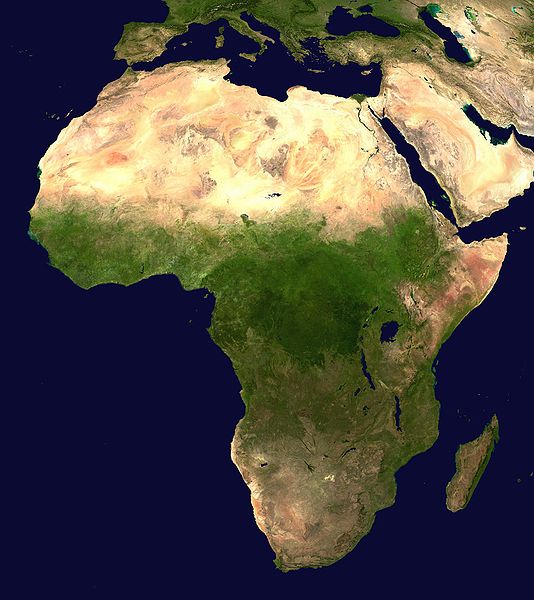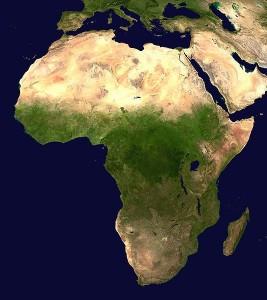
The China-Africa Nexus: Implications for U.S. Strategy
 China has announced a US$20 billion loan package to Africa, to be disbursed over the next three years, in a move that ensures strong ties between the continent and Beijing for years to come. The amount of the loan package is double that made by China in 2009 and according to Beijing, demonstrates that China will “continue to steadfastly stand together with the African people, and will forever be a good friend, a good partner and a good brother.”
China has announced a US$20 billion loan package to Africa, to be disbursed over the next three years, in a move that ensures strong ties between the continent and Beijing for years to come. The amount of the loan package is double that made by China in 2009 and according to Beijing, demonstrates that China will “continue to steadfastly stand together with the African people, and will forever be a good friend, a good partner and a good brother.”
On an annual basis, China’s loan package to Africa outspends the US$7.8 billion in bilateral assistance promised by the US in 2012. It is easy to assert that China is attempting to use soft power in a regional power play to thwart US objectives in the continent. This interpretation does not take into account China’s strategic objectives in Africa, which are primarily energy-based and needs-driven rather than security- or rent-seeking in nature. Regardless, China’s presence and influence in Africa does have implications for US objectives in and relations with Africa.
China has a longstanding strategic interest in Africa, providing integrated aid packages to the continent for several many years. The second-largest economy in the world, China became a net importer of energy resources in 1993. In 2010, China imported an average 4.8 million barrels of oil per day and in 2035, oil imports are projected to top 13 million barrels per day . Though one-half of Chinese oil imports come from the Middle East, one-third of its supply comes from African nations.
China does not condition its aid to Africa: there is no requirement or expectation of governmental reform and improvement in human rights, in stark contrast to US assistance. As exemplified by a railroad project in Benguela, Angola, Chinese loans are a blend of concessionary, subsidized, and non-concessionary funds provided alongside cheap lines of credit. All China expects is repayment, often in the form of future energy exports.
This loan structure encourages African agency in fund appropriation, and lines of credit become primary funding sources for infrastructure projects. It also fails to address the issues of undemocratic governments, human rights abuses, and unfair labor practices.
This latest aid package from China ensures that Africa will remain obligated to China for years to come. China provides African aid often in exchange for energy exports. Consequently, resource inventories may be designated for repayments to China and are unavailable to the market. Additionally, because these arrangements are bilateral, executed between two sovereign nations, the international community has almost no power in mitigating any resultant effects.
On account of its resource-driven and unconditioned aid strategy in Africa, China’s lending practices could contribute to the development of an African version of the resource curse, a contentious phenomenon noted in several nations rich in natural resources. While in the short-term, a boon in resource production and export can have economic benefits for a nation, it sometimes produces serious, negative political and social effects in the long-term. If a full-fledged “curse” does not develop, the narrow focus on exploiting African natural resources still nurtures undiversified and therefore, less resilient, African economies.
Finally, the structure of Chinese lending to African nations often encourages unfair labor practices and does little to promote democratic governance and human rights. Chinese companies frequently import their own skilled labor, depriving local workers of employment opportunities and adversely influencing local wages. The unconditioned nature of aid packages promotes a behavioral status quo on the part of governmental and other aid recipients, which can be seen as perpetuating trends of disenfranchisement and human rights violations.
China’s presence in the African continent, while not a power play, could impact US relations with African nations. In gaining influence through its aid, China may well have established an upper hand by offering immense and diversified aid packages without conditions. This structure incentivizes African nations to accept loans from China as opposed to the conditional assistance offered by the US. This is not a competition in which the US should participate. It would require subjugating our expectations of democratic behavior and respect for human rights to strategic objectives, which is of little short-term utility and counter to our principles.
The US has a very different strategy in Africa — counterterrorism, regional security, democracy promotion, and economic development – and a plethora of tools at its disposal to achieve these objectives. AFRICOM is working to bolster security and build partnerships throughout the continent, numerous US programs work to promote democracy and economic development in Africa, and the US enjoys positive perceptions in many African nations. There are several ways for the US to engage in a broader and deeper manner with Africa; competing with China by handing out “free money” is not one.
~
The American Security Project hosted Representative Adam Smith for a discussion on the increasing importance of Africa to US policy. Event materials are available here.






[…] The China-Africa Nexus: Implications for U.S. Strategy […]
Грузчики…
Грузчики Москвы…